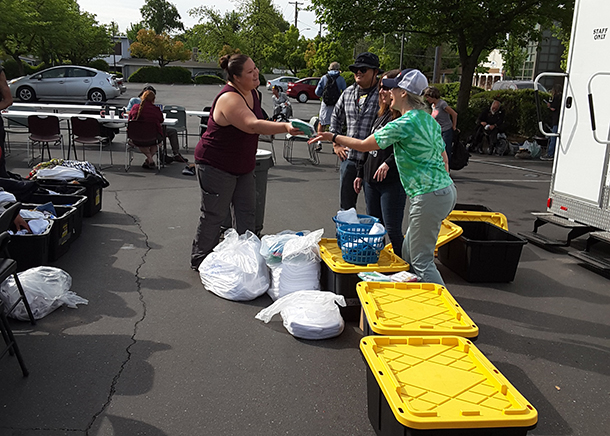Delcie Strahan didn’t expect to move back to her small town in Shasta County, Calif., after college. But in 2012 that’s where she found herself — and her passion — beginning a career in public health as a patient educator.
Today, after graduating from the Keck School of Medicine of USC Master of Public Health online program in Fall 2016, she has become the face of a city health campaign benefiting her community’s homeless population.
As an educator, Strahan enjoys helping people find control over their health and lives.
“There’s a beautiful moment, usually about halfway through our programs, where the principles and skills we’ve been learning start to click into place,” she said. “Those are the moments that inspired me to pursue my Master of Public Health from the University of Southern California.”
Studying in the MPH Health Education and Promotion Track, she learned the theories behind programs she was already teaching — from diabetes self-management to tobacco cessation — and how to employ critical thinking to change the way she thought and saw the world around her.
Strahan said her biggest accomplishment while pursuing her degree was completing her practicum project — which grew into the successful public health program it is today, known as the Clean Break Partnership.
Starting out, she planned to use photovoice, a photography analysis method, to document the homeless population in Redding, Calif. But when her adviser said, “What’s your ask?” she realized she first needed to know exactly what would make a difference in the residents’ lives.
One day, a homeless person came up to her and asked if there was a bathroom nearby. With no public restrooms around and most businesses hanging “Restrooms are for Customers Only” signs, Strahan didn’t have a good answer for him.
The encounter inspired her. She visited parks and community centers to conduct a needs assessment that confirmed many people were either forgoing showers or bathing in the river — and using the streets instead of bathrooms. With few safe places available to practice hygiene, Strahan knew something had to be done and that she was the person to do it.
With her focus established, she used her project’s photovoice work to hold a fundraiser, which raised $10,000 toward increasing access to showers and restrooms in the city. The vision: to purchase a trailer that would move from location to location, reaching as many people as possible — and supply each visitor with a shower kit and fresh towel — while emphasizing socially conscious practices like a clothing exchange to reduce waste.
“Having the opportunity to dig my hands into a project that I loved so dearly was an absolutely invaluable experience that I will always carry with me,” she said.
Post-graduation, Strahan is proud to continue her career as a health educator.
“I use my master’s every single day, whether or not I’m working,” she said. “What I learned in my MPH program informs all my decisions — both personal and professional.
She urges all future graduates to find a field, job or population they love working with. “If you love what you, do then it really isn’t work.”
— Larissa Puro


